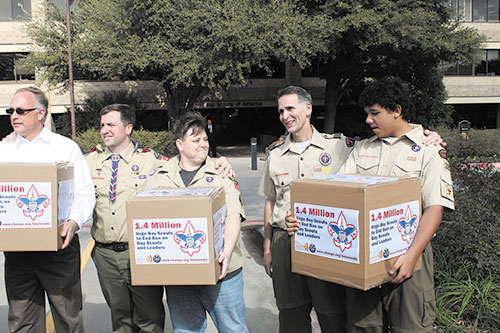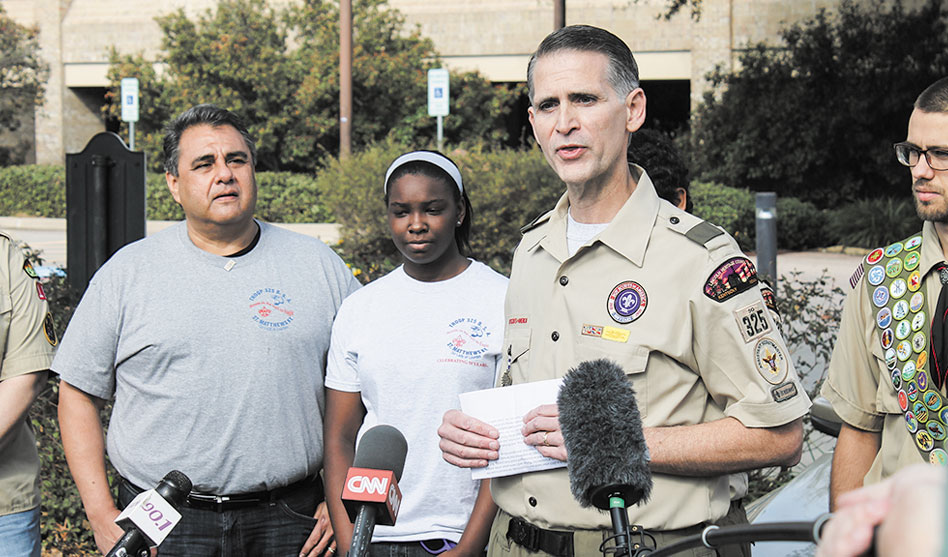Greg Bourke, third from left, speaking outside Boy Scout headquarters in Irving.
Greg Bourke, one of the named plaintiffs in the Obergefell decision, began his activism in Dallas
DAVID TAFFET | Senior Staff Writer
taffet@dallasvoice.com
Greg Bourke became one of the named complainants in the Obergefell v. Hodges marriage equality decision when his lawsuit against the state of Kentucky was consolidated by the Sixth Circuit. But, by chance, his activism actually began on a trip to Irving here in North Texas.
Bourke and his husband, Michael De Leon, sued the Commonwealth of Kentucky for the right to marry and the right to add a second same-sex parent to an adoption in the state.
They won at the trial level, but their victory was overturned on appeal, along with other cases from Michigan, Ohio, Tennessee and Kentucky.
Because the decision of their circuit court conflicted with other appeals courts that had weighed in, their case was appealed to the U.S. Supreme Court, which decided to hear the appeal. Anecdotally, Bourke said he heard his appeal was filed seven minutes later than Jim Obergefell’s, which is why the name of the case was shortened to “Obergefell” rather than Bourke.
In his new book Gay, Catholic, and American: My Legal Battle for Marriage Equality and Inclusion, Bourke talks about the importance of his faith and how he, his husband and two adopted children were mostly accepted by his local parish. Part of his story is about how he didn’t have to fight for the right to have his sons baptized in his church.
 Where he did have to fight was to become scout leader for his son’s troop.
Where he did have to fight was to become scout leader for his son’s troop.
A few weeks after Dallas Voice ran a cover story on the Boy Scouts decision to ban gay and lesbian scout leaders and gay scouts, activists around the country began collecting signatures on a petition to BSA to allow LGBT scouts and leaders. Bourke was like many who wanted to lead a troop. He had earned Eagle Scout status and then was barred from the organization.
He and his family traveled to Dallas to deliver the petition and expected to be met by a BSA official at their Irving headquarters. Instead, they were met by guards who allowed the group to deliver the boxes of petitions to the lobby of the building with no press accompanying them.
While a change in Boy Scouts policy took several years, that event was the beginning of the change. And because of that experience, Bourke said, he was somewhat prepared to become the face of marriage equality in Kentucky.
An important element in his memoir is his religion. While the hierarchy of the church doesn’t “get it,” on a local level, Catholics have strong family values that include unconditional love, Bourke said. And when he was approached to become a communion minister in his church and later to lead the committee, the story became that there was no story.
When Bourke and his husband brought their first son to the church to be baptized, they wondered if they’d be turned away. Instead, they found they simply became more beloved members of their congregation.
And when Ontario became the first place in North America to recognize same-sex marriage, the couple with their children traveled to Niagara Falls for a ceremony.
Their first motivation in becoming marriage equality plaintiffs to have their out-of-state marriage recognized was to protect their children.
Because of more generous adoption benefits at his company, De Leon went on record as the adoptive father. But Kentucky law only allowed a married couple or a single person to adopt. Bourke said he understood that if anything happened to his husband, he’d have no legal claim to his children.
Bourke described the anticipation and joy of going to the Supreme Court to hear the decision read. What disappointed him, though, was Chief Justice John Roberts’ dissenting opinion. When he learned it’s rare that the dissent is even read, Bourke said he took the opinion even more as a personal attack.
In his dissent, Roberts sarcastically congratulated same-sex couples who would be celebrating their marriages that day. “But do not celebrate the Constitution,” Roberts read from his opinion. “It had nothing to do with it.”
And finally, Bourke said it was meaningful to him to have his new book published by University of Notre Dame Press, his alma mater — but also one of the most conservative Catholic institutions in the U.S. When he asked about it, they gave him a good academic answer: It is an important story to tell. And to top it all off, Bourke and De Leon were named 2015 Persons of the Year by the National Catholic Reporter.














